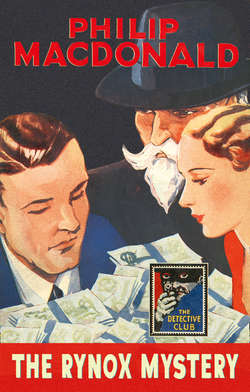Читать книгу The Rynox Mystery - Philip MacDonald - Страница 13
SEQUENCE THE THIRD Friday, 29th March 193— 9 a.m. to 10 a.m.
ОглавлениеF.X. sat at breakfast. Through the big French windows of his dining-room in William Pitt Street, the spring sun blazed, turning the comfortable but rather sombre room into a chamber of temporary glory. F.X., so to speak, read The Morning Mercury with one hand and with the other conversed with his man, Prout.
Prout was a short, stiff little man. There was a legend about Prout—started probably by F. X. himself—to the effect that he had nineteen hairs and that twelve of these were upon the right side of his parting and seven upon the other. He was clean-shaven—very shaven and very, very clean. He was also very quiet. There was another legend—this one having its birth with Tony—to the effect that Prout really was a ‘foreigner,’ only knowing three words of English: ‘Very good, sir.’ Prout, who had been with F. X. now for seven years—ever since RYNOX had been founded—adored F. X. In a lesser, quieter way he was fond of Tony. For Peter, he would have gone through nearly as much, if not quite, as for F. X. himself.
‘If you, Prout,’ said F. X., ‘were Lord Otterburn and owned the daily paper with the largest net sale (don’t forget net, Prout, there’s always a lot of holes in a net) what would you do?’
Prout put a cover upon the dish of kidneys. ‘Nothing, sir,’ said Prout.
F. X. looked at him. ‘And a very good answer too. Don’t know what it is about you, Prout, but you always say the right thing with the most delightfully innocent air of not knowing you’ve said it.’
‘Yes, sir,’ said Prout. ‘Excuse me, sir, but Mrs Fairburn wanted me to ask you whether you could see her for a moment before you leave for the office.’
F. X. nodded. ‘Certainly, certainly.’ He looked at his watch. ‘You’d better tell her to come in now, hadn’t you? I shall be off in a few minutes.’
‘Very good, sir,’ said Prout, and left the room so silently, so unobtrusively that the moment he was gone F. X. wondered, as he always wondered on these occasions, whether Prout had really ever been with him at all.
The door opened again. Mrs Fairburn came in. Mrs Fairburn was F. X.’s housekeeper. She, too, had been with F. X. for seven years. She, too, strictly within her very strict notions of right and wrong, would have done anything for F. X. She was, as Tony frequently said, almost too good to be true. Her hair, quite black despite her fifty-four years, was scraped from her forehead and piled high upon the back of her head. She wore black satin always. Sometimes there were bugles upon the black satin, but at other times the black satin was plain. Always when she walked the black satin rustled. About her severely corsetted waist was a belt and inevitably there dangled from this belt a bunch of keys. No one in the house had ever discovered—since nothing in this house ever was locked—what these keys were for. But always they were there, swinging and dangling and jangling. They told you, in fact, where Mrs Fairburn, moving about her duties in the tall, narrow house, could be found. You had only to stand still and listen. Presently you would hear them and then you could track Mrs Fairburn.
‘Good-morning!’ said F. X. ‘Lovely morning, Mrs Fairburn.’
‘Gord-mooning, Mr Baynedik. Truly a delaiteful day. It makes one feel really as if spring were drawing on.’
F. X. nodded. ‘Yes, doesn’t it? Well, what’s the trouble, Mrs Fairburn?’
The thin lips of Mrs Fairburn writhed themselves into one of their sudden smiles. ‘No trouble, Mr Baynedik. Nothing of the sort. Only rather an extraordinary thing has happened.’ She produced, from some recess in the black-clad angularity of her presence, an envelope; advanced, bearing this rather like a lictor his symbolic bundle, towards the table. ‘Mr Baynedik,’ she said, ‘this letter came by a district maysenger boy last night when you were out. It is, as you see, addressed to the housekeeper and staff. Seeing this address, Mr Baynedik, Ay opened the letter and inside Ay found three orchestra fauteuils for the Royal Theatre for tonight’s performance. It is a piece which is apparently entitled The Sixth Wife of Monsieur Paradoux … rather, I must say, an astonishing title, Mr Baynedik.’
F. X. struggled with a smile. ‘Certainly. Certainly. Damn silly names some of these people call their damn silly plays. Well, what about it, Mrs Fairburn? Do you want to go?’
‘Ay did think, Mr Baynedik, that perhaps we would like to go as these seats have been presented to us so kindly, albeit so mysteriously.’
F. X. frowned. ‘We’d like to go … Oh, I see. You want to take the rest of the staff, Mrs Fairburn? Yes, take them by all means. Do you all good, I’m sure. And you can keep an eye on them and see that they don’t get into mischief. Wonder who’s sending you theatre tickets …’
‘Ay cannot,’ said Mrs Fairburn, ‘understand the gift mayself, Mr Baynedik, but Ay believe there is a saying to the effect that one should not look at the mouth of a horse that has been given to one. Ay must confess that Ay could never see the meaning of this saying, but Ay have no doubt it is an apposite one.’
F. X. buried himself behind his paper. ‘Yes. Go, by all means. It’s very good of you, I’m sure, to chaperone the other two.’
